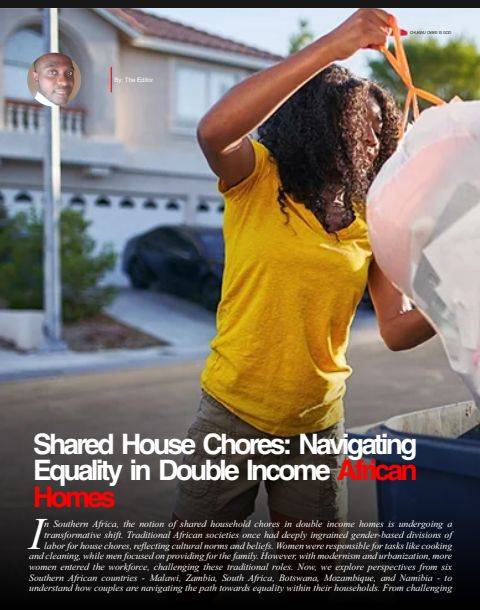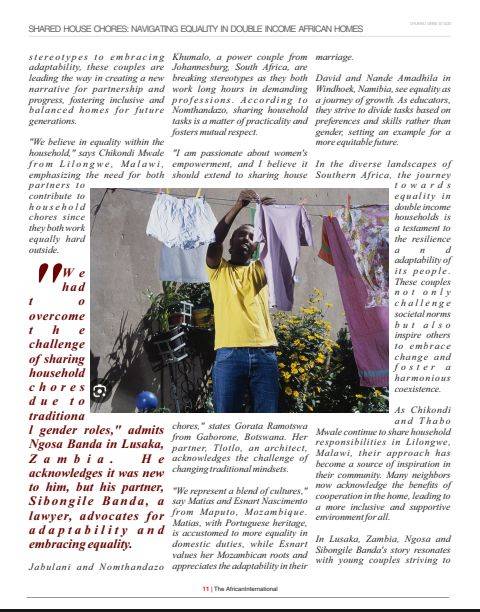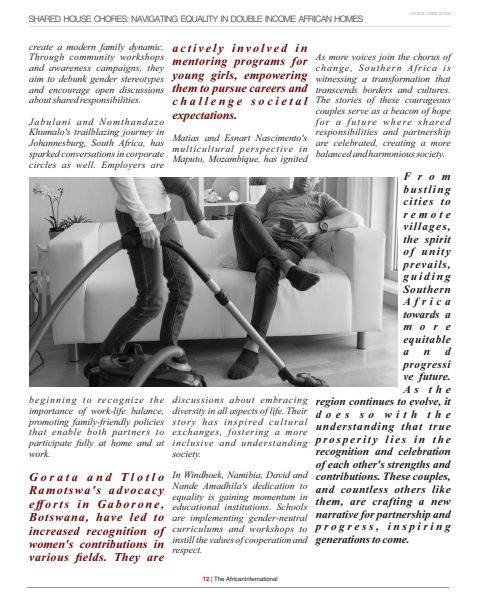
By: Ollus Ndomu
In Southern Africa, the notion of shared household chores in double income homes is undergoing a transformative shift. Traditional African societies once had deeply ingrained gender-based divisions of labor for house chores, reflecting cultural norms and beliefs. Women were responsible for tasks like cooking and cleaning, while men focused on providing for the family. However, with modernism and urbanization, more women entered the workforce, challenging these traditional roles. Now, we explore perspectives from six Southern African countries – Malawi, Zambia, South Africa, Botswana, Mozambique, and Namibia – to understand how couples are navigating the path towards equality within their households. From challenging stereotypes to embracing adaptability, these couples are leading the way in creating a new narrative for partnership and progress, fostering inclusive and balanced homes for future generations.
“We believe in equality within the household,” says Chikondi Mwale from Lilongwe, Malawi, emphasizing the need for both partners to contribute to household chores since they both work equally hard outside.
“We had to overcome the challenge of sharing household chores due to traditional gender roles,” admits Ngosa Banda in Lusaka, Zambia. He acknowledges it was new to him, but his partner, Sibongile Banda, a lawyer, advocates for adaptability and embracing equality.

Jabulani and Nomthandazo Khumalo, a power couple from Johannesburg, South Africa, are breaking stereotypes as they both work long hours in demanding professions. According to Nomthandazo, sharing household tasks is a matter of practicality and fosters mutual respect.
“I am passionate about women’s empowerment, and I believe it should extend to sharing house chores,” states Gorata Ramotswa from Gaborone, Botswana. Her partner, Tlotlo, an architect, acknowledges the challenge of changing traditional mindsets.
“We represent a blend of cultures,” say Matias and Esnart Nascimento from Maputo, Mozambique. Matias, with Portuguese heritage, is accustomed to more equality in domestic duties, while Esnart values her Mozambican roots and appreciates the adaptability in their marriage.
David and Nande Amadhila in Windhoek, Namibia, see equality as a journey of growth. As educators, they strive to divide tasks based on preferences and skills rather than gender, setting an example for a more equitable future.
In the diverse landscapes of Southern Africa, the journey towards equality in double income households is a testament to the resilience and adaptability of its people. These couples not only challenge societal norms but also inspire others to embrace change and foster a harmonious coexistence.
As Chikondi and Thabo Mwale continue to share household responsibilities in Lilongwe, Malawi, their approach has become a source of inspiration in their community. Many neighbors now acknowledge the benefits of cooperation in the home, leading to a more inclusive and supportive environment for all.
In Lusaka, Zambia, Ngosa and Sibongile Banda’s story resonates with young couples striving to create a modern family dynamic. Through community workshops and awareness campaigns, they aim to debunk gender stereotypes and encourage open discussions about shared responsibilities.
Jabulani and Nomthandazo Khumalo’s trailblazing journey in Johannesburg, South Africa, has sparked conversations in corporate circles as well. Employers are beginning to recognize the importance of work-life balance, promoting family-friendly policies that enable both partners to participate fully at home and at work.
Gorata and Tlotlo Ramotswa’s advocacy efforts in Gaborone, Botswana, have led to increased recognition of women’s contributions in various fields. They are actively involved in mentoring programs for young girls, empowering them to pursue careers and challenge societal expectations.
Matias and Esnart Nascimento’s multicultural perspective in Maputo, Mozambique, has ignited discussions about embracing diversity in all aspects of life. Their story has inspired cultural exchanges, fostering a more inclusive and understanding society.
In Windhoek, Namibia, David and Nande Amadhila’s dedication to equality is gaining momentum in educational institutions. Schools are implementing gender-neutral curriculums and workshops to instill the values of cooperation and respect.
As more voices join the chorus of change, Southern Africa is witnessing a transformation that transcends borders and cultures. The stories of these courageous couples serve as a beacon of hope for a future where shared responsibilities and partnership are celebrated, creating a more balanced and harmonious society.
From bustling cities to remote villages, the spirit of unity prevails, guiding Southern Africa towards a more equitable and progressive future. As the region continues to evolve, it does so with the understanding that true prosperity lies in the recognition and celebration of each other’s strengths and contributions. These couples, and countless others like them, are crafting a new narrative for partnership and progress, inspiring generations to come.


